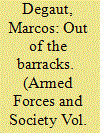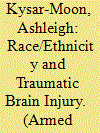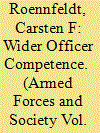|
|
|
Sort Order |
|
|
|
Items / Page
|
|
|
|
|
|
|
| Srl | Item |
| 1 |
ID:
163582


|
|
|
|
|
| Summary/Abstract |
Which types of militarization affect child mortality? Which type appears to lower it; which appears to push it higher? This article focuses on social militarization (i.e., troops as a proportion of workforce-aged population) and praetorian militarization (i.e., the military’s control or strong influence over the government), investigating their impact on child mortality using pooled time series analysis covering 142 countries from 1996 through 2008. We find that social and praetorian militarization have opposite effects even after controlling for potentially confounding influences. Access to basic public health infrastructures and education mediates between each type of militarization and child mortality.
|
|
|
|
|
|
|
|
|
|
|
|
|
|
|
|
| 2 |
ID:
163575


|
|
|
|
|
| Summary/Abstract |
Identity fusion, the visceral sense of interconnectedness between oneself and the members of a group, has been associated with military service anecdotally and examined among foreign military groups. However, no study to date has explored fusion and its relationship with functioning among U.S. military members. The aims of this study were (1) to examine the incremental predictive validity of fusion, (2) to examine the relationship between fusion and pro- and antisocial in-group behaviors, and (3) to determine how one’s attitude toward their military service may affect fusion. Data were collected via self-report using Amazon’s Mechanical Turk software. Results indicated that fusion predicted progroup beliefs and in-group helping behaviors above and beyond other indicators of military identity. Further, satisfaction with the military mediated the relationship between fusion and willingness to give time to other veterans. Identifying an important mediator of fusion expands upon earlier work in the field and suggests routes for future inquiry.
|
|
|
|
|
|
|
|
|
|
|
|
|
|
|
|
| 3 |
ID:
163573


|
|
|
|
|
| Summary/Abstract |
Organizational cynicism is a key factor in employee burnout, emotional exhaustion, and turnover and directly reduces organizational citizenship behavior, commitment, and effectiveness. Still, little empirical research examines antecedents of organizational cynicism. This study applies a dark side of leadership framework from an organizational and leadership perspective to examine the relationship between perceived toxic leadership and organizational cynicism in a military educational environment. Survey and interview data were used to assess the relationship between toxic leadership and organizational cynicism as reported by U.S. Air Force Academy cadets. Results demonstrate a positive relationship between toxic leadership and organizational cynicism, such that those who report having leaders with toxic characteristics are likely to have more negative attitudes toward their organization. Self-promotion emerged as the sole significant toxic leadership dimension predicting cynicism. Group differences in perceived toxic leadership are found for race but not for gender or amount of time within the organization.
|
|
|
|
|
|
|
|
|
|
|
|
|
|
|
|
| 4 |
ID:
163574


|
|
|
|
|
| Summary/Abstract |
It is paradoxical that authoritarian leaders often hold power for long periods of time, despite their states being plagued with rebellion. Scholarship has argued the practice of coup-proofing is potentially responsible for this trend. However, though regular armed forces are often allowed to whither when coup-proofing, states often retain substantial capabilities in the form of well-armed and well-trained coup-proofing units. This article argues that coup-proofing is more likely to contribute to rebellion when leaders are hesitant to deploy their coup-proofing units: when coup risk is high. Using a global sample of authoritarian regimes for the years 1971–2011, tests indicate that heavily coup-proofed regimes do in fact see a considerable increase in civil war likelihood when the risk of a coup is high but see no change in conflict propensity when coup risk is low.
|
|
|
|
|
|
|
|
|
|
|
|
|
|
|
|
| 5 |
ID:
163580


|
|
|
|
|
| Summary/Abstract |
This study is among the first examining lesbian, gay, and bisexual (LGB) service members in the United States following the “don’t ask, don’t tell” policy repeal. Higher levels of outness predict better mental health among general LGB populations. The military environment, like other traditional/conservative settings, may alter this relation; however, no data are available on outness among LGB service members in the United States. We examined 236 service members’ level of outness and satisfaction with outness in relation to depression and anxiety symptoms. Results revealed greater level of outness was related to higher satisfaction with outness, with each variable related to better mental health. Importantly, satisfaction fully mediated the relation between level of outness and mental health, indicating satisfaction to be a more salient predictor than level alone. Findings relevant to military policy makers and health-care providers are discussed along with recommendations for advancement of research into outness among LGB people.
|
|
|
|
|
|
|
|
|
|
|
|
|
|
|
|
| 6 |
ID:
163577


|
|
|
|
|
| Summary/Abstract |
Why some democratic revolutions succeed while others fail? The scholarly community has sought to address this issue from various perspectives, from rational choice approaches to collective action theories. Too little attention, however, has been paid to analyzing the role of the military. By discussing the different types of interactions played by the military in five cases of successful democratic revolutions—the 1910 Portuguese Republican Revolution, the 1958 Venezuelan Revolution, the 1960 April Revolution in South Korea, the 1989 Velvet Revolution in Czechoslovakia, and the 2000 Bulldozer Revolution in Yugoslavia—and three cases of failed revolutions, the 1905 bourgeois-liberal revolution in Russia, the 1989 Tiananmen Square Protests in China, and the 2016 Turkey’s coup attempt, this study finds out that the key factor in determining their outcome is the army’s response and that the military backing is a necessary condition for a democratic revolution to succeed.
|
|
|
|
|
|
|
|
|
|
|
|
|
|
|
|
| 7 |
ID:
163583


|
|
|
|
|
| Summary/Abstract |
In his recent article Saving Samuel Huntington and the Need for Pragmatic Civil–Military Relations, Travis proposes a model of civil–military relations based on “pragmatic civilian control.” This model has three main shortcomings. First, it does not adequately answer the question of “professional supremacy” versus “civilian supremacy” in making crucial decisions during wartime. Second, the distinctions between “wars of choice” and “wars of necessity,” and about the “kind of war” being fought, key theoretical variables mentioned by the author, are hard to judge objectively. And third, the new model would likely exacerbate rather than diminish the problem of military leaders getting involved in political and even partisan controversies; this is particularly problematic, given the unusual situation of many military leaders in the Trump administration occupying civilian positions of authority. If it is to be of practical use to policy makers, future scholarship on pragmatism and civil–military relations must address these weaknesses.
|
|
|
|
|
|
|
|
|
|
|
|
|
|
|
|
| 8 |
ID:
163581


|
|
|
|
|
| Summary/Abstract |
The authors examine racial/ethnic differences in screening positive for traumatic brain injury (TBI) and in diagnosis among service members upon returning from war in Afghanistan and Iraq. Using data from the Post-Deployment Health Assessment and Re-Assessment, and military health-care encounters from 2008 to 2009, they estimate logistic regressions in a sample of 46,488 service members. Hispanic and Asian service members do not differ from White service members in screening positive for TBI but have 19% and 33% lower odds of diagnosis, respectively. Compared to White service members, Black service members are less likely to screen positive for TBI immediately after deployment and about as likely 3–6 months later, yet have 27% lower odds of diagnosis. Further, racial/ethnic minority service members have a lower probability of TBI diagnosis than White service members at all self-reported symptom levels, suggesting there is a discrepancy between symptoms and diagnosis related to race/ethnicity.
|
|
|
|
|
|
|
|
|
|
|
|
|
|
|
|
| 9 |
ID:
163579


|
|
|
|
|
| Summary/Abstract |
In wars fought against insurgents, civilian casualties present the challenging dilemma of balancing security and stability while targeting insurgents who operate within the civilian population. In Afghanistan, the International Security Assistance Force (ISAF) has made minimizing civilian casualties a top-tier strategic issue. Yet beyond annual reports, there has been a lack of data-driven analysis into the number of civilians killed by ISAF operations. This research investigates ISAF-caused civilian casualties between 2010 and 2013, incorporating civilian casualty events to investigate changes in ISAF “lethality.” This analysis finds that although ISAF-caused civilian casualties decreased overall, this was mitigated by the tactic employed (airpower vs. on the ground operations). The implications of this analysis for theories of military adaptation, future population-centric operations, and current military operations (e.g., in Iraq and Syria) are discussed.
|
|
|
|
|
|
|
|
|
|
|
|
|
|
|
|
| 10 |
ID:
163578


|
|
|
|
|
| Summary/Abstract |
This article uses student records from a nonselective public institution to assess whether student veterans’ academic performance and preparation differed before and after the post–9/11 GI Bill. We find equivalent ACT scores between cohorts who were and were not eligible for this new funding source, suggesting similar academic preparation. Grade point averages are also invariant across cohorts. We identify a large decline in the probability that student veterans eligible for post–9/11 GI Bill funding pursue degrees in science, technology, engineering, and math disciplines. These results suggest that increased access to college funding had no effects on academic performance and distributed student veterans more broadly across the university curriculum, suggesting an important policy strategy to help recent veterans successfully transition to the civilian labor market.
|
|
|
|
|
|
|
|
|
|
|
|
|
|
|
|
| 11 |
ID:
163576


|
|
|
|
|
| Summary/Abstract |
Identifying and developing officer competence is important to a nation’s security and a crucial attribute of a legitimate military establishment. Critics have claimed that the U.S. officer corps favors a narrow conception of expertise that limits the armed forces’ utility as an instrument of policy. Drawing from the dialogue between Huntington and Janowitz, as well as Aristotle’s notion of practical wisdom, this article proposes a wider understanding of officer competence consisting of four distinct conceptual categories. The U.S. defense establishment favors “military skill” over other categories of competence. As a result, the officer corps is poorly prepared for 21st-century warfare. To remedy this situation, professional military education should cultivate military leaders that, in addition to military skill, have sociopolitical competence and practical wisdom. In this context, this article suggests strategies to develop such competencies that officers need to be able to achieve a diversity of national political goals.
|
|
|
|
|
|
|
|
|
|
|
|
|
|
|
|
|
|
|
|
|